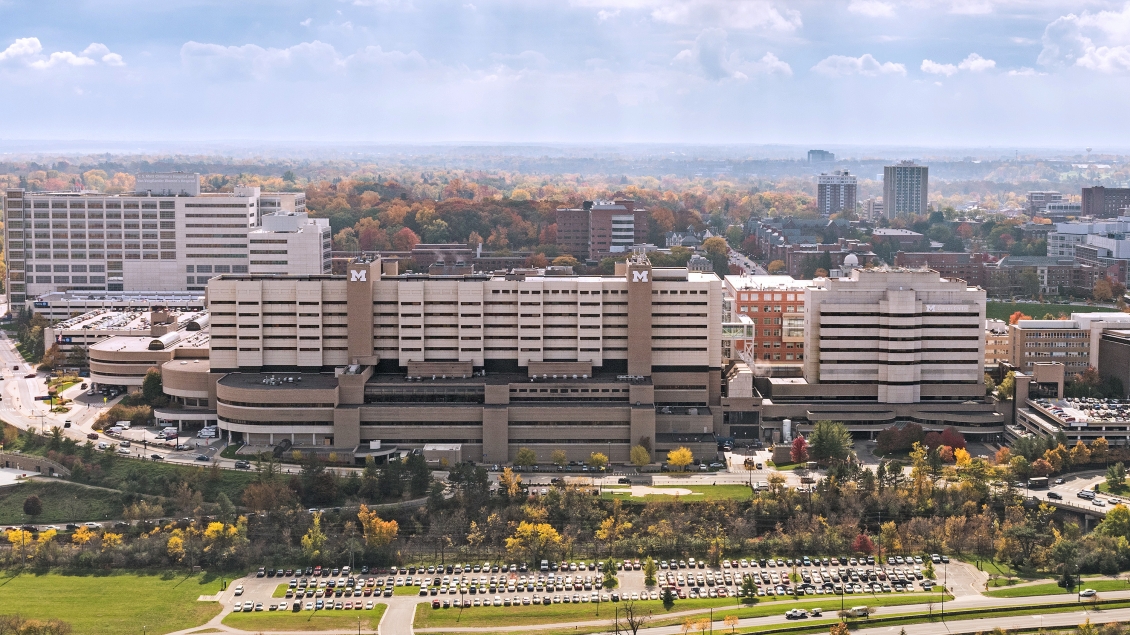
Trainees are able to choose between a clinically-based or laboratory-based research training pathway, providing trainees a comprehensive and specialized research training experience that aligns with their individual interests and career goals.
Clinically-based pathway
Trainees electing a clinically-based research training pathway and who are pursuing patient-oriented research require comprehensive and formal training in relevant fields such as clinical research design, epidemiology, health economics, and advanced biostatistical methods. These trainees will be advised to seek formal instruction in research design and statistical analysis from one or more of a number of programs and resources available on the medical campus including the:
- U-M Institute for Healthcare Policy & Innovation (IHPI) Clinician Scholars Program
- On Job/On Campus (OJ/OC) Program through the U-M School of Public Health
In most instances, tainees selecting this pathway will have the opportunity to obtain a Master's Degree in Health and Healthcare Research or in Clinical Research Design and Statistical Analysis, if it is appropriate for their research career goals.
Laboratory-based pathway
Trainees electing a laboratory-based research-training pathway will enter the laboratory of one of the Division’s mentors. In some instances, specific course(s) may serve as an adequate complement to address a trainee’s particular needs. Courses either taken or audited by past and current trainees over the past several years include:
- Molecular Genetics (HG 541) and Human Genetics (HG 542) in the Department of Human Genetics
- Introduction to Infectious Disease (Microbiol 505)
- Experimental Immunology (Immunol 850)
- Signal Transduction (Biochemistry 576)
- Special Topics in Signal Transduction (Biochemistry 591)
- Other courses that may be of interest to trainees include Immunology (Microbiol 440), Virology (Microbiol 415), Cellular Biotechnology (Microbiology 504), Introduction to Scientific Communication (Microbiol 512/Pharmacology 502), Molecular and Cellular Immunology (Microbiol 640)
Post-graduate fellows who have entered the Multidisciplinary Research Training Program in Lung Disease participate in a well-defined curriculum that incorporates experiential and didactic opportunities for advanced degree training.
Year 1
In the spring of the first year, trainees are expected to identify a research area (and faculty mentor) in which the subsequent two years will be focused. First year trainees participate in a research orientation program during the winter to assist in this process. Together, the trainee and mentor develop a project for investigation that is of interest to the trainee and within the expertise of the faculty member. In certain instances, joint mentorship provided by two faculty members within the Division, or by one divisional faculty member and a collaborator from another unit is appropriate. Early in the second year, the trainee presents a research conference in which they synthesize existing knowledge, present the problem for investigation and describe the proposed plan of investigation. The faculty members and trainees in attendance provide feedback to the trainee and mentor about the proposed project; this process of peer review provides a useful experience for the trainee and often strengthens the experimental approach.
Year 2 & 3
During the second and third years, the trainee carries out the proposed work in the laboratory or clinical research facilities of the faculty mentor(s). The trainee also benefits from interactions with other trainees, technicians, and collaborating investigators. The trainee also participates in laboratory meetings and journal clubs specific to individual laboratories or research groups. Presenting research findings at regional and national meetings and submitting work for publication are both important aspects of the investigative endeavor. The trainee will receive guidance and specific assistance in learning to prepare data for oral and written presentation, to prepare graphics, and to organize talks and prepare slides. Throughout the two-year research training period, it is anticipated that the trainee will assume increasing intellectual responsibility and technical independence. Trainees may also have the opportunity to prepare grant applications to fund advanced research training. Experience preparing protocols for animal studies and human studies institutional review board approval will also be gained.
To enhance the research training experience, each trainee and mentor assembles a research advisory committee including two-four additional faculty members. Twice yearly, the trainee presents an update of their progress, and the Committee provides the trainee and mentor with advice regarding the research project as well as career development.
Our campus offers an abundance of facilities designed to support research and innovation. Our spaces are dedicated to academic excellence, biomedical research, and clinical healthcare. Collectively, our facilities exemplify Michigan Medicine's mission of advancing healthcare to serve Michigan and the world at large.